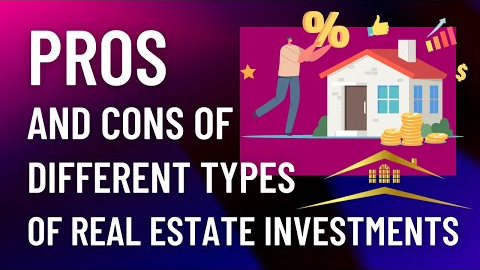The Pros and Cons of Different Types of Real Estate Investments
35 View
Share this Video
- Publish Date:
- March 14, 2023
- Category:
- Where to Buy
- Video License
- Standard License
- Imported From:
- Youtube
Tags

Welcome to our video on the pros and cons of different types of real estate investments. Real estate can provide a great opportunity for investment, but it's important to know what you're getting into. In this video, we'll explore the different types of real estate investments, along with the advantages and disadvantages of each.
First, we'll discuss rental properties. Owning rental properties can be an excellent option for generating long-term passive income. However, being a landlord also involves a lot of work, such as finding tenants, handling repairs and maintenance, and managing rental laws and regulations. Vacancies, bad tenants, and unexpected expenses can also impact your rental income. Despite the challenges, owning rental properties can also appreciate in value over time, providing the potential for long-term appreciation and capital gains.
Next, we'll delve into flipping houses, which involves buying a property, renovating it, and selling it for a profit. House flipping can offer a high return on investment in a short amount of time, but it's also a risky venture. It requires a good understanding of the real estate market and renovation costs to avoid overpaying for the property or spending too much on renovations. House flipping is also time-consuming, as you'll need to manage contractors, oversee renovations, and ensure the project stays within budget and schedule.
We'll then explore real estate investment trusts (REITs), which allow investors to own a piece of income-generating real estate properties without managing the property themselves. REITs invest in a variety of real estate properties, including office buildings, shopping centers, apartments, and hotels, offering diversification and liquidity. However, the returns on REITs may be lower than other types of real estate investments, and they are subject to market fluctuations.
Lastly, we'll discuss real estate crowdfunding, which allows investors to pool their money together to invest in a specific real estate project. Real estate crowdfunding platforms typically have lower minimum investment requirements than traditional real estate investments, and investors can choose which projects they want to invest in, allowing for greater control and customization of their investment portfolio. However, real estate crowdfunding is a newer investment option and may be subject to more risk and volatility, and investments are typically illiquid, meaning they cannot be easily sold or traded.
In conclusion, each type of real estate investment has its own set of advantages and disadvantages. It's essential to do your research and understand the risks and potential returns before investing in any type of real estate. We hope this video has provided you with valuable information on your real estate investment journey. Thanks for watching!
#realestateinvesting #prosandcons #realestate #crowdfunding
Did you miss our previous article...
https://trendinginrealestate.com/where-to-buy/how-to-find-the-perfect-real-estate-agent-tips-and-tricks-for-choosing-a-real-estate-agent














